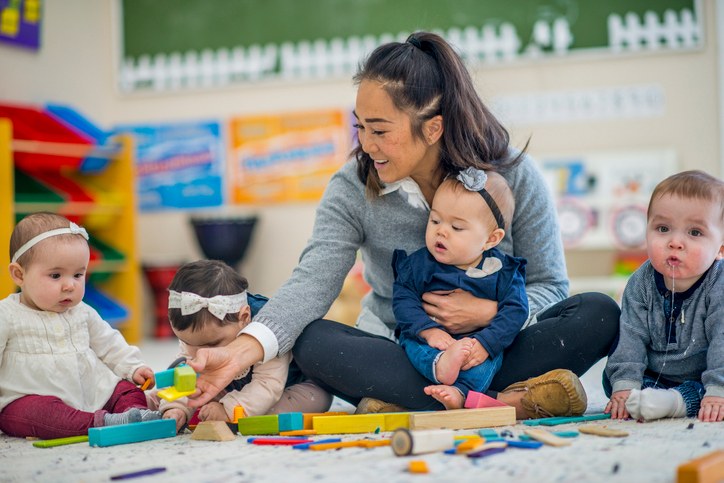Posted: April 16, 2021
The first three years of life carry immense implications for later health and development. Infancy/toddlerhood is a period of rapid growth and development and sets the stage for executive functioning, school readiness, and ultimately long-term academic success and well-being. Given that this is seen as such a critical period for later development, along with the fact that infant-toddler care is the most sought-after form of child care in the U.S., makes the job of infant-toddler educators so important.

Understanding infant-toddler development
Changes in the first three years of life are rapid and immense with infant-toddler development categorized by dramatic brain and physical growth, an accelerated acquisition of language skills, intense responses to stimuli, and an extreme reliance on adult relationships. Think about all that happens between birth and 3-years-old. Children go from merely paying attention to speech, to understanding it, to providing one- or two-word responses, and to forming multi-word phrases. Similarly, during this period children start off not being able to support their own head, to sitting up, rolling over, crawling, walking, and even beginning to help with self-care and other tasks (e.g., getting dressed and cleaning up). This is also a key period for the development of social relationships. Infancy/toddlerhood is when children begin to develop a sense of the what the world around them is like and start to form attachments with caregivers. These early views of the world and these relationships can ultimately influence later feelings of anxiety and the quality of other relationships, even into adulthood!
What does a high-quality infant-toddler environment look like?
In order to ensure that all infants and toddlers are positioned favorably in terms of social, emotional, and cognitive development, it is vital that infant and toddler educators are able to provide a warm, safe, and stimulating environment that is supportive of the needs of the children in their care. Here are some things that you can do to help promote positive development in infancy and toddlerhood.
 Read and speak with the children in your care.
Read and speak with the children in your care.
To support the rapid language and cognitive development of infants and toddlers, caregivers need to speak and read to children. The number of words young children hear is predictive of their own vocabulary and language skills later on. Make eye contact when infants and toddlers speak to you (even if an infant is only babbling and not yet forming full words) and try to ensure they can see your mouth when you speak (this is particularly important with infants). Reading is an excellent way to expose children to different words. Also, you can name things around the classroom when interacting with children. For example, asking a toddler to bring you a dustpan to help clean up would be more appropriate than asking a child to bring you "that" and pointing at the dustpan. Even just verbally explaining what you are doing can help children build early language skills (e.g., "I'm going to transfer these beads from this large container to the small container.").
Respond to infants and toddlers with warmth.
Infants and toddlers learn through the interactions they have with adults, and these daily interactions set the stage for their later development by providing a foundation for social-emotional and cognitive skill development. As such, it is important that you are responsive to the needs of infants and toddlers and respond with warmth, patience, and kindness. If a child is upset, you should attempt to comfort the child. This can impact how the child views themselves and the world around them. If they are upset and the adults around them respond harshly, the child may internalize this and view the world as a scary place and question if they are deserving of love.
Set up your inside and outside spaces in an age-appropriate and safe manner.
Infants and toddlers learn through exploration. Infants and toddlers need spaces that allow for both quiet and active play, as well as places where they can interact one-on-one with their caregivers. Try to provide developmentally appropriate toys and activities that support motor, social-emotional, cognitive, and language development. For young infants, this may be toys with different textures, toys that make noise, or things to look at (soft mirror). Older infants may enjoy pretend play (e.g., puppets, dolls, vehicles), toys that they can move and stack (e.g., nesting cups or soft blocks), and other toys that support their motor development (e.g., boards with knobs and switches). Toddlers are likely to be more active than infants and often enjoy toys like soft balls they can throw or tunnels they can climb through. Toddlers also often enjoy simple puzzles, dress-up clothes, safety scissors, and large crayons. No matter the materials you provide remember that because infants and toddlers are likely to explore, it is essential that their space is both clean and safe.
Because of the importance of healthy infant-toddler development, it is easy for infant-toddler educators to feel overwhelmed. However, it is important to remember that this is also a period of tremendous opportunity, where warmth, patience, and attention can go a long way. As an infant-toddler educator, you have the unique chance to have a longstanding impact on children's lives that can ultimately set them up to be healthy and happy older children, adolescents, and adults.
Better Kid Care offers a variety of infant-toddler courses. To learn more about this extremely important developmental period please be sure to check out the following courses:
- "Healthy Kids, Healthy Futures: Support Breastfeeding"
- "Creating Special Moments with Infants/Toddlers"
- "Early Intervention: Support Infants/Toddlers"
- "Family Child Care: Support Infants/Toddlers"
- "Giving Your Best: Making Secure Attachments"
- "Responding to Biting and Teaching Sharing"
- "Infant-Toddler Care: Daily Routines"
- "Infant-Toddler Care: Emotional/Social Development"
- "Infant-Toddler Care: Guiding Behavior"
- "Infant-Toddler Care: Healthy Spaces"
- "Infant-Toddler Care: Language/Literacy"
- "Infant-Toddler Care: Learning through Play"
- "Infant-Toddler Care: Partnerships with Families"
- "Infant-Toddler Care: Physical/Cognitive Development"
- "Infant-Toddler Care: Quality Supervision"
- "Infant-Toddler Care: Safety"
- "Infant-Toddler Care: Sensitive, Nurturing Professionals Needed"
- "Staff Orientation - Working with Infants and Toddlers"
- "Rock Solid: Building Positive Relationships, Birth - 3 years, Part 1"
- "Rock Solid: Building Positive Relationships, Birth - 3 years, Part 2"
- "Rock Solid: Enhancing Emotional Literacy: Birth - Age Three"
- "Safe Sleep Practices for Caregivers: Reduce the Risk of SUID"
- "Understanding Toddlers"

